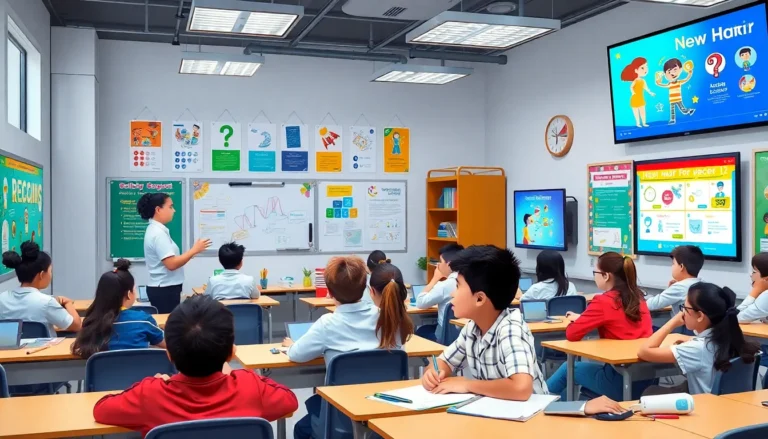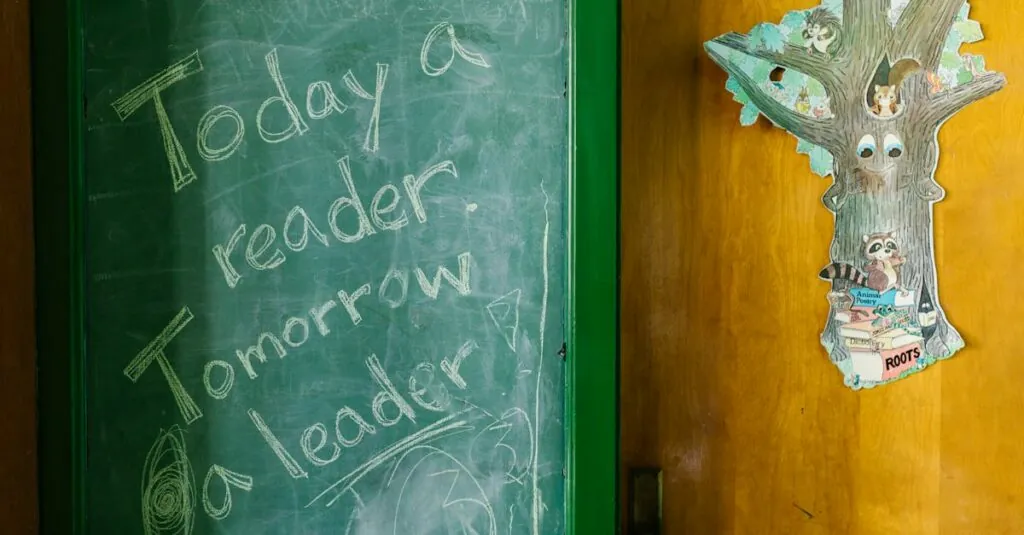Table of Contents
ToggleEducation today feels like a game of dodgeball—everyone’s throwing opinions around, and some are bound to hit hard. From debates over curriculum content to the role of technology in the classroom, controversial issues are sparking heated discussions among educators, parents, and students alike. It’s a wild ride where everyone has a stake, and the stakes are high.
Overview of Controversial Issues in Education Today
The landscape of education is marked by several contentious issues. Curriculum content often stirs debate among educators and parents. Topics such as the inclusion of certain historical events or the emphasis on social justice can lead to disagreements. Many stakeholders advocate for diverse perspectives in educational materials, while others fear that certain viewpoints overshadow traditional teachings.
Technology integration becomes another point of contention. The effectiveness of digital learning tools varies widely. Some educators embrace technology as an enhancement to traditional teaching methods, arguing it prepares students for a digital future. Conversely, others express concerns about students’ over-reliance on devices and the diminished face-to-face interactions.
Standardized testing faces criticism too. Critics argue that these assessments fail to capture the full range of a student’s abilities. Many educators advocate for alternative assessment methods that emphasize critical thinking and creativity. This shift aims to provide a more holistic view of student learning.
Mental health awareness in schools represents a growing area of concern. Increasingly, schools address student mental health needs but face challenges in providing adequate resources. Some advocate for comprehensive programs, while others question their funding and implementation.
Equity in education serves as a foundational issue. Disparities in educational resources and opportunities persist among different student populations. Advocates work to ensure all students receive equal support, emphasizing the need for systemic change.
These issues illustrate the complexities of today’s educational landscape. Discussions continue to evolve as stakeholders seek solutions that prioritize the best interests of students across the board.
Political Influence on Education
Political factors significantly shape education, influencing funding, resource allocation, and curriculum decisions. Diverse stakeholders, including politicians, educators, and community members, express varied interests in educational development.
Funding and Resource Allocation
Funding allocations directly impact students’ educational experiences. Disparities in financial resources often create uneven opportunities, resulting in inequity among schools. Many districts depend heavily on local property taxes, leading to significant differences in funding. Increased advocacy for equitable funding models highlights the necessity for change. Effective resource distribution enables better support for schools in underfunded areas, ensuring all students access quality education and materials.
Curriculum Controversies
Curriculum controversies often spark intense debates among educators and policymakers. Inclusion of specific historical events and social issues frequently generates disagreement. Some advocate for comprehensive education on topics like race and gender equality, while others argue that certain subjects should remain excluded. Decisions about curriculum content reflect broader political ideologies, influencing what students learn. Ongoing discussions aim to navigate these contentious issues while considering the diverse perspectives in today’s classrooms.
Social Issues in Education
Social issues in education shape the dialogue among stakeholders, impacting policies and practices. Equity and access stand out as significant concerns educators face today.
Equity and Access
Equitable access to educational resources heavily influences student outcomes. Disparities in funding often result from reliance on local property taxes, limiting opportunities for students in underfunded districts. The lack of resources can lead to overcrowded classrooms and outdated materials. Advocacy for equitable funding models highlights the necessity of systemic change. Policymakers increasingly focus on ensuring all students have access to quality education, regardless of zip code. Innovative solutions, like state-wide funding initiatives, aim to bridge the gap, enabling fair opportunities for every student.
Diversity and Inclusion
Diversity and inclusion play crucial roles in modern classrooms. Schools are now more diverse than ever, reflecting various cultural backgrounds. Inclusion strategies foster environments where every student feels valued and respected, enhancing the overall learning experience. Educators emphasize teaching history and social issues to promote understanding and empathy among students. Opposition exists against certain curricula, raising questions about representation and voice. Engaging diverse perspectives in content equips students with critical thinking skills. Culturally responsive teaching practices ensure that all students see themselves reflected in their education, supporting a more inclusive society.
Technology and Education
Technology plays a significant role in modern education. Discussions about its impact often spark debate among educators, parents, and students alike.
Online Learning Debate
Online learning has gained prominence recently, prompting mixed reactions among stakeholders. Some educators advocate for its flexibility, noting how it accommodates different learning styles and schedules. Others raise concerns over the effectiveness of virtual interaction, emphasizing the need for face-to-face connections to foster relationships. Students express varied opinions as well; while many appreciate the convenience, others miss the classroom environment that motivates them. Data from 2021 indicates that approximately 40% of high school students prefer in-person classes for engagement and support purposes, demonstrating the ongoing discussion regarding online education’s role in future learning.
Data Privacy Concerns
Data privacy issues in education have surfaced as technology becomes more integrated into learning environments. Schools collect extensive data on students, including behavioral patterns and academic performance, raising alarms among parents and advocates. Risks associated with data breaches and unauthorized access to information create unease about students’ safety. A survey conducted in late 2020 revealed that 65% of parents expressed worries over how their children’s information is managed. As discussions continue, educators and policymakers focus on developing robust policies that safeguard student privacy while supporting effective technology use in classrooms.
Teacher and Student Rights
Education today raises crucial questions about the rights of teachers and students. These rights are essential for fostering a respectful and productive learning environment.
Free Speech and Expression
Free speech in schools has sparked significant debate. Students often navigate the fine line between expressing their opinions and adhering to school policies. In 2021, approximately 60% of students felt that schools should protect their right to share controversial views. This statistic highlights the need for clear guidelines that balance free expression with maintaining a safe educational atmosphere. Advocates argue for open dialogue on sensitive topics, encouraging respectful exchanges. Schools increasingly aim to educate students about their rights while fostering a culture of respect for differing opinions.
Discipline and Accountability
Discipline strategies in education often come under scrutiny. The effectiveness of zero-tolerance policies raises important questions about fairness and consistency. Data from 2022 indicated that 70% of educators believe alternative approaches can enhance accountability. Schools are exploring restorative justice models to address behavior issues while promoting understanding. These models focus on repairing harm and restoring relationships rather than solely punishing students. As educators analyze discipline practices, the emphasis shifts toward creating supportive environments that hold students accountable while fostering growth and learning.
The landscape of education is undeniably complex and filled with contentious issues that demand attention. As stakeholders navigate debates over curriculum content technology integration and equity in access, the focus remains on fostering environments that prioritize student well-being and learning outcomes.
The ongoing discussions reflect a collective effort to address disparities and ensure that all students receive a quality education. As educators policymakers and communities engage in these vital conversations the hope is to create a more inclusive and effective educational system that meets the needs of every learner.
Ultimately the commitment to understanding diverse perspectives and advocating for systemic change will shape the future of education.







